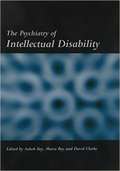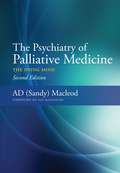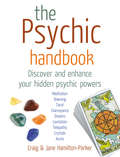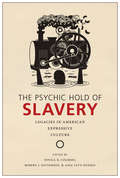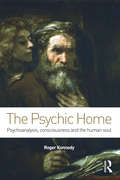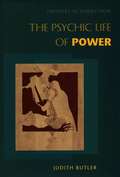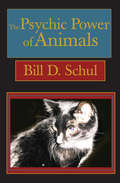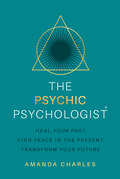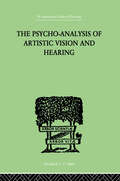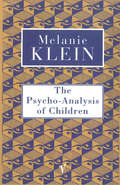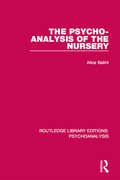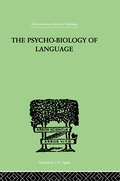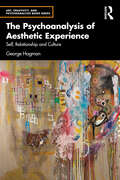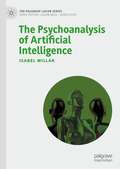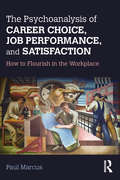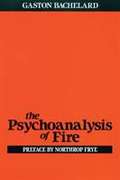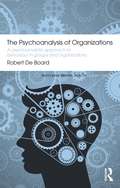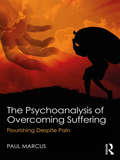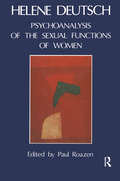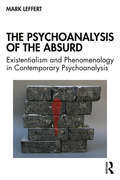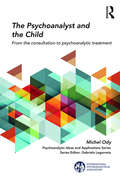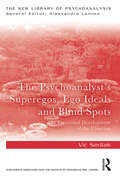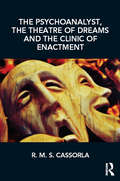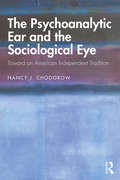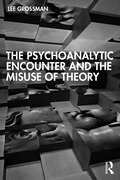- Table View
- List View
The Psychiatry of Intellectual Disability
by David Clarke Ashok Roy Meera RoyComprehensive concise and easily accessible this is the first health economics dictionary of its kind and is an essential reference tool for everyone involved or interested in healthcare. The modern terminology of health economics and relevant terms used by economists working in the fields of epidemiology public health decision management and policy studies are all clearly explained. Combined with hundreds of key terms the skilful use of examples figures tables and a simple cross-referencing system between definitions allows the often complex language of health economics to be demystified.
The Psychiatry of Palliative Medicine: The Dying Mind
by Sandy MacLeodThis Second Edition of The Psychiatry of Palliative Medicine remains a practical and pragmatic distillation of the psychiatry relevant to the terminally ill. Revised throughout and greatly expanded by the addition of two entirely new chapters, it reviews the major psychiatric syndromes encountered in palliative care - depression, anxiety, delirium - and examines psychopharmacological and psychological interventions in detail. It succinctly considers the psychiatric aspects of pain, sleep, cognitive impairment, terminal neurodegenerative diseases, sedation, artificial feeding and euthanasia. The dying, chronically ill psychiatric patient is also discussed. The author has drawn on his great experience in both consultation-liaison psychiatry and palliative medicine to produce an essential, evidence-based guide for all healthcare professionals involved in palliative care. These include consultants and senior nurses, as well as psychiatrists, especially consultation-liaison psychiatrists, and trainees. 'I find this an immensely sympathetic book, beautifully written. It is a testimony to the summation of specialist psychiatric knowledge, broad scholarship and a rich personal practice in bedside palliation.' From the Foreword by Ian Maddocks Reviews of the first edition: '...a relevant, highly readable and reasonably priced book which will be of interest to all, whether from a psychiatric or palliative care background, who seek to improve the care of dying patients INTERNATIONAL PSYCHOGERIATRICS 'Practical, scientifically based and scholarly, addressing a comprehensive set of common and important clinical problems in palliative care. The book will doubtlessly be highly valued by palliative care clinicians for its practical and thorough overview of some of the most challenging clinical problems they face. Excellent and timely.' AUSTRALIAN AND NEW ZEALAND JOURNAL OF PSYCHIATRY
The Psychic Handbook: Discover and Enhance Your Hidden Psychic Powers
by Craig Hamilton-ParkerMost of us have had psychic experiences at one time or another; we may find a new place strangely familiar, finish other people's sentences or sense a definite positive or negative feeling about a house. Almost everyone has some latent psychic ability. The Psychic Handbook provides a fun, entertaining way to develop your psychic power. Craig Hamilton-Parker takes you step-by-step through skills such as mediumship, prophesy, psychometry, dream analysis, dowsing, numerology and clairvoyance. He also shows how you can learn to meditate in order to liberate the intuition that is the basis of all psychic ability, and find out about crystals and how they can have a beneficial effect on your life.Packed with information, experiments and games, including special cards developed by scientists to test your telepathic skills, The Psychic Handbook will show how you can explore an undiscovered part of your personality and unlock your psychic potential.
The Psychic Hold of Slavery: Legacies in American Expressive Culture
by Robert J. Patterson Margo Natalie Crawford Brandon J. Manning Aida Levy-Hussen Régine Michelle Jean-Charles Calvin Warren Soyica Diggs Colbert Michael Chaney Douglas A. Jones Jr. Gershun AvilezWhat would it mean to "get over slavery"? Is such a thing possible? Is it even desirable? Should we perceive the psychic hold of slavery as a set of mental manacles that hold us back from imagining a postracist America? Or could the psychic hold of slavery be understood as a tool, helping us get a grip on the systemic racial inequalities and restricted liberties that persist in the present day? Featuring original essays from an array of established and emerging scholars in the interdisciplinary field of African American studies, The Psychic Hold of Slavery offers a nuanced dialogue upon these questions. With a painful awareness that our understanding of the past informs our understanding of the present--and vice versa--the contributors place slavery's historical legacies in conversation with twenty-first-century manifestations of antiblack violence, dehumanization, and social death. Through an exploration of film, drama, fiction, performance art, graphic novels, and philosophical discourse, this volume considers how artists grapple with questions of representation, as they ask whether slavery can ever be accurately depicted, trace the scars that slavery has left on a traumatized body politic, or debate how to best convey that black lives matter. The Psychic Hold of Slavery thus raises provocative questions about how we behold the historically distinct event of African diasporic enslavement and how we might hold off the transhistorical force of antiblack domination.
The Psychic Home: Psychoanalysis, consciousness and the human soul
by Roger KennedyThe Psychic Home: Psychoanalysis of Consciousness and the Human Soul develops, from a number of different viewpoints, the significance of home in our lives. Roger Kennedy puts forward the central role of what he has termed a ‘psychic home’ as a vital psychic structure, which gathers together a number of different human functions. Kennedy questions what we mean by the powerfully evocative notion of the human soul, which has important links to the notion of home and he suggests that what makes us human is that we allow a home for the soul. As an illustration of this concept he explores how it can help to understand a vital element of William Wordsworth’s development as a poet. The word soul is both abstract and yet also powerfully emotive. Kennedy shows that it can be approached from a number of different angles, from psychoanalysis, philosophy, religion, sociology, literature and neuroscience. The Psychic Home, discusses the mysteries and complexities of the soul, and aims to evoke some restoration of its place in our thinking. It illustrates how the word soul and similar key words, such as spirit and inwardness, express so much that is essential for humans, even if we cannot be too precise about their meanings. Insightful, enlightening and broad reaching, The Psychic Home brings the concept of the soul centre stage as an entity that is elemental, an essence, irreducible, and what makes us human as subjects of experience. It will be essential reading for psychoanalysts, psychotherapists, neuroscientists, philosophers and those interested in spirituality and religion.
The Psychic Life of Power: Theories in Subjection
by Judith ButlerAs a form of power, subjection is paradoxical. <P><P>To be dominated by a power external to oneself is a familiar and agonizing form power takes. To find, however, that what "one" is, one's very formation as a subject, is dependent upon that very power is quite another. <P><P>If, following Foucault, we understand power as forming the subject as well, it provides the very condition of its existence and the trajectory of its desire. <P><P>Power is not simply what we depend on for our existence but that which forms reflexivity as well. Drawing upon Hegel, Nietzsche, Freud, Foucault, and Althusser, this challenging and lucid work offers a theory of subject formation that illuminates as ambivalent the psychic effects of social power.
The Psychic Power of Animals
by Bill D. SchulDiscover the incredible psychic abilities of cats, dogs, horses, canaries, and more in this revelatory book from an expert of interspecies communication. Pets are more than companions. The animals we share our lives with are channels to another world. Documentation exists that proves animals do indeed possess a sixth sense. Discover the mysterious and fantastic revelations about dogs who trace their masters across vast distances; dogs who read minds; dolphins as super beings; conversations between people and animals; the strange friendship between Native Americans and rattlesnakes; animals who reside in pyramids; the German shepherd who taught meditation; the amazing ability of animals to think and reason; and much more that will forever change the way you look at animals.
The Psychic Psychologist: Heal Your Past, Find Peace in the Present, Transform Your Future
by Amanda CharlesDo you feel like your life looks perfect from the outside, but on the inside you&’re falling apart? Have you gone from one practitioner to the next desperately seeking solutions and yet still suffer? If the answer&’s &‘yes&’, then you need The Psychic Psychologist®.Combining traditional psychology, energy work and quantum theory, as well as professional and life experience, The Psychic Psychologist offers a completely unique perspective on healing.With evidence-backed psychological interventions alongside spiritual and intuitive practices, The Psychic Psychologist will help you break free from suffering, transform your pain and go beyond all limitations to create the life you desire. It&’s a book that will help you tap more deeply into your higher power and follow your inner voice, so you can embrace a new reality and consciously construct positive change in your present and for your future.So, no matter how many times life has kicked you when you&’re down, this book will show you that when you&’re fully connected to all the layers of your existence – body, heart, mind and soul – you can turn your pain into purpose and live a life you love.&‘I always hoped that someone would bring a totally new perspective to the way we view human consciousness. Amanda has absolutely done that with this wonderful book.&’Gordon Smith, internationally renowned medium, spiritual teacher and bestselling author.
The Psycho-Analysis Of Artistic Vision And Hearing: An Introduction to a Theory of Unconscious Perception (International Library Of Psychology Ser. #Vol. 38)
by Ehrenzweig, AntonThis book deals with the inarticulate form elements hidden in the unconscious structure of a work of art or—what comes to the same thing — with the unconscious structure of the perception processes by which we actively create or passively enjoy these unconscious form elements. In order to become aware of inarticulate forms we have to adopt a mental attitude not dissimilar to that which the psycho-analyst must adopt when dealing with unconscious material, namely some kind of diffuse attention.
The Psycho-Analysis of Children: The Conduct Of The Psycho-analysis Of Children As Seen In The Treatment Of A Ten Year Old Boy
by Melanie KleinThe Psycho-Analysis of Children, first published in 1932, is a classic in its subject, and revolutionised child analysis. Melanie Klein had already proved, by the special technique she devised, that she was a pioneer in that branch of analysis. She made possible the extension of psycho-analysis to the field of early childhood, and in this way not only made the treatment of young children possible but also threw new light on psychological development in childhood and on the roots of adult neuroses and psychoses.
The Psycho-Analysis of the Nursery: Analysis Of The Nursery (Routledge Library Editions: Psychoanalysis)
by Alice BalintOriginally published in English in 1953, this title was first printed in Hungarian in 1931. Already translated into German, French and Spanish, Alice Balint (the first wife of Michael Balint) had intended to translate the title into English herself, but died suddenly at the beginning of the Second World War. Eventually their son, by this time a qualified doctor, was instrumental in bringing this edition about.
The Psycho-Biology Of Language: AN INTRODUCTION TO DYNAMIC PHILOLOGY (International Library Of Psychology Ser.)
by George Kingsley ZipfThis is Volume XXI in a series of twenty-one on the Cognitive Psychology. Orignally published in 1936, this is a study on the introduction to Dynamic Philology.
The Psychoanalysis of Aesthetic Experience: Self, Relationship and Culture (Art, Creativity, and Psychoanalysis Book Series)
by George HagmanIn The Psychoanalysis of Aesthetic Experience: Self, Relationship and Culture, George Hagman eloquently provides an overview of ideas regarding the aesthetic foundation of human experience and the way in which this aesthetic perspective can shed light on human development, culture, and analytic clinical process. The book discusses the relationship between the psychology of art and the aesthetics of psychoanalytic treatment. Hagman presents a comprehensive psychoanalytic model of the psychology of aesthetics, creativity, beauty, ugliness, and the sublime, as well as a theory of aesthetics across the dimensions of subjectivity, self, intersubjectivity, and culture. Starting from the point of early childhood development, he argues for the importance of exploring the implications of this important psychological phenomenon for clinical practice, highlighting how aesthetics can shed light on a dimension of the psychotherapeutic process that has thus been neglected. This book is an illuminating and informative read for all psychoanalysts, and anyone interested in the intersection of psychoanalytic practice, aesthetics, creativity, and culture.
The Psychoanalysis of Artificial Intelligence (The Palgrave Lacan Series)
by Isabel MillarThis book examines the crucial role of psychoanalysis in understanding what AI means for us as speaking, sexed subjects. Drawing on Lacanian theory and recent clinical developments it explores what philosophy and critical theory of AI has hitherto neglected: enjoyment. Through the reconceptualization of Intelligence, the Artificial Object and the Sexual Abyss the book outlines the Sexbot as a figure who exists on the boundary of psychoanalysis and AI. Through this figure and the medium of film, the author subverts Kant’s three Enlightenment questions and guides readers to transition from asking 'Does it think?' to 'Can it enjoy?' The book will appeal in particular to students and scholars of psychoanalysis, philosophy, film and media studies, critical theory, feminist theory and AI research.
The Psychoanalysis of Career Choice, Job Performance, and Satisfaction: How to Flourish in the Workplace
by Paul MarcusFreud said that "love and work" are the central therapeutic goals of psychoanalysis; the twin pillars for a sound mind and for living the "good life." While psychoanalysis has masterfully contributed to understanding the experience of love, it has only made a modest contribution to understanding the psychology of work. This book is the first to explore fully the psychoanalysis of work, analysing career choice, job performance and job satisfaction, with an eye toward helping people make wiser choices that bring out the best in themselves, their colleagues and their organization. The book addresses the crucial questions concerning work: how does one choose the right career; what qualities contribute to excellence in performance; how best to implement and cope with organizational change; and what capacity and skills does one need to enjoy every day work? Drawing on psychoanalytic thinking, vocational counseling, organizational psychology and business studies, The Psychoanalysis of Career Choice, Job Performance, and Satisfaction will be invaluable in clinical psychoanalytic work, as well as for mental health professionals, scholars, career counselors and psychologists looking for a deeper understanding of work-based issues.
The Psychoanalysis of Fire
by Gaston Bachelard; Alan C. M. RossTo define him as briefly as possible - he is a philosopher, with a professional training in the sciences, who devoted most of the second phase of his career to promoting that aspect of human nature which often seems most inimical to science: the poetic imagination.
The Psychoanalysis of Organizations: A psychoanalytic approach to behaviour in groups and organizations (Routledge Mental Health Classic Editions)
by Robert De BoardOne of the most pressing needs of modern society is to understand and construct organizations that are not only effective in terms of carrying out work but that also allow and encourage people to develop their full human potential. Psychoanalytic theory describes those primary processes that lie at the heart of human activity and provides new insights for understanding group and organizational behaviour. With a new introduction written by Vega Roberts, this Classic Edition of The Psychoanalysis of Organizations presents the theories of Sigmund Freud, Melanie Klein, Wilfred Bion, Elizabeth Lewin and Eric Menzies in plain language and shows their relevance to normal working life. First published in 1978, Robert De Board takes a wide-ranging overview of the major psychoanalytic theorists and organizational researchers, and analyses how the two groups can work together. Written in a very accessible style, it makes sophisticated psychoanalytic and management concepts comprehensible and usable for anyone.
The Psychoanalysis of Overcoming Suffering: Flourishing Despite Pain
by Paul MarcusThe Psychoanalysis of Overcoming Suffering: Flourishing Despite Pain offers a guide to understanding and working with a range of everyday causes of suffering from a psychoanalytic perspective. The book delineates some of the underappreciated, everyday facets of the troubling and challenging psychological experiences associated with love, work, faith, mental anguish, old age, and psychotherapeutic caregiving. Examining both the suffering of the patient and therapist, Paul Marcus provides pragmatic insights for changing one’s way of being to make suffering sufferable. Written in a rich but accessible style, one that draws from ancient wisdom and spirituality, The Psychoanalysis of Overcoming Suffering provides an essential guide for psychoanalysts and psychotherapists and their clients, and will also appeal to anyone who is interested in understanding how we suffer, why we suffer and what we can do about it.
The Psychoanalysis of Sexual Functions of Women
by Helene DeutschThis book discusses the problems of the sexual life of woman throughout the duration of her sexual maturity, i.e., from the beginning of puberty onwards. It reports all the new insights into the mental life of woman in her relations to the reproductive function, with the aid of the analytic method.
The Psychoanalysis of the Absurd: Existentialism and Phenomenology in Contemporary Psychoanalysis
by Mark LeffertThe Psychoanalysis of the Absurd offers an interdisciplinary study of Existentialism and Phenomenology and their importance to the clinical work of Contemporary Psychotherapy and Psychoanalysis. The concept of Absurdity, developed by Camus, has never been applied to the therapeutic situation or directly contrasted with its antithesis; the search for personal meaning. The book begins with narrative accounts of the historical development of Psychoanalysis, Existentialism and Phenomenology in 20th century Europe. The focus here is on fin de siècle Vienna and Paris between the Wars as the principal incubators of the two disciplines. Accompanied by composite case illustrations, Leffert then explores his own development of the Psychoanalysis of the Absurd, drawing on the work of Camus, Heidegger and Sartre. Absurdity is first discussed in relation to the Bio-Psycho-Social Self and Dasein is posited as a bridge concept, with personal meaning as the antithesis to Absurdity, before being discussed in relation to the world and how it impinges on self. A final chapter attempts to tie together particular issues raised by the book: Subjective well-being, Meaning, thrownness, Absurdity, Death and Death Anxiety and how we have become technologically enhanced human beings. Existential psychotherapy and psychoanalysis have, until now, largely gone their own way: the goal of this book is to fold them back into Contemporary Psychoanalysis. Establishing that the concept of Absurdity is of singular clinical importance to both diagnosis and therapeutic action, this book will be of great interest to clinicians, philosophers, and interdisciplinary scientists.
The Psychoanalyst and the Child: From the Consultation to Psychoanalytic Treatment (The International Psychoanalytical Association Psychoanalytic Ideas and Applications Series)
by Michel OdyThe Psychoanalyst and the Child explores the unique nature of psychoanalytic work with children. This book is based on more than 30 years of practice and reflection within the framework of the Alfred Binet Centre in Paris, France. The very great diversity of situations encountered at the Centre brings the issue of therapeutic indications to the forefront. Michel Ody focuses on the diversification of fifteen clinical situations and their theorization, ranging from basic consultation to psychoanalytic treatment. With this framework as his starting-point, he looks at the common features between the therapeutic consultation – a consultation that becomes therapeutic – and the analytic treatment, as well as what differentiates them. This implies examining, at the technical level, the different forms of interventions and interpretations presented as well as their metapsychological articulation. Ody draws on decades of clinical expertise to set out not just the basic considerations and problems typically encountered in work with this patient group, but clear guidelines for methodology and technique. Psychoanalysis can be an intellectual process, dependent on the ability of the patient to express themselves verbally, which can make working clinically with children challenging. The Psychoanalyst and the Child seeks to help psychoanalysts through the most challenging of clinical treatments with this patient group.
The Psychoanalyst's Superegos, Ego Ideals and Blind Spots: The Emotional Development of the Clinician (The New Library of Psychoanalysis)
by Vic SedlakPsychotherapists and psychoanalysts enter an emotional relationship when they treat a patient; no matter how experienced they may be, their personalities inform but also limit their ability to recognise and give thought to what happens in the consulting room. The Psychoanalyst’s Superegos, Ego Ideals and Blind Spots investigates the nature of these constrictions on the clinician’s sensitivity. Vic Sedlak examines clinicians’ fear of a superego which threatens to become censorious of themselves or their patient and their need to aspire to standards demanded by their ego ideals. These dynamic forces are considered in relation to treatments which fail, to supervision and to recent innovations in psychoanalytic technique. The difficulty of giving thought to hostility is particularly stressed. Richly illustrated with clinical material, this book will enable practitioners to recognise the unconscious forces which militate against their clinical effectiveness.
The Psychoanalyst, the Theatre of Dreams and the Clinic of Enactment
by R.M.S. CassorlaThis book is recommended to psychoanalysts and therapists interested in the analytical technique, and particularly that work with patients who have deficits in their symbolization capacity. It presents studies of technical aspects of the analytical process with patients who are difficult to reach. Collusions named 'chronic enactments' show that the analytic dyad cannot dream and the analytical field is paralyzed without the analyst perceiving it. Chronic enactments are undone through unconscious acts or behaviours that threaten to destroy the analytical process: behaviours that are named 'acute enactments'. The thorough study of these enactments show that they take the dyad to an awareness of the discrimination between self and object and re-establish the capacity to dream. It is demonstrated that this occurs in an attenuated traumatic form, revealing in the analytical field the externalization of primitive non-dreamed traumas. Clinical, artistic, and mythical models are part of the discussion. The emphasis on clinical aspects allows readers to use different theories to consider the clinical facts. The clinical theories used by the author are mostly post-Kleinian and Bionian.
The Psychoanalytic Ear and the Sociological Eye: Toward an American Independent Tradition
by Nancy ChodorowIn The Psychoanalytic Ear and the Sociological Eye: Toward an American Independent Tradition, Nancy J. Chodorow brings together her two professional identities, psychoanalyst and sociologist, as she also brings together and moves beyond two traditions within American psychoanalysis, naming for the first time an American independent tradition. The book's chapters move inward, toward fine-tuned discussions of the theory and epistemology of the American independent tradition, which Chodorow locates originally in the writings of Erik Erikson and Hans Loewald, and outward toward what Chodorow sees as a missing but necessary connection between psychoanalysis, the social sciences, and the social world. Chodorow suggests that Hans Loewald and Erik Erikson, self-defined ego psychologists, each brings in the intersubjective, attending to the fine-tuned interactions of mother and child, analyst and patient, and individual and social surround. She calls them intersubjective ego psychologists—for Chodorow, the basic theory and clinical epistemology of the American independent tradition. Chodorow describes intrinsic contradictions in psychoanalytic theory and practice that these authors and later American independents address, and she points to similarities between the American and British independent traditions. The American independent tradition, especially through the writings of Erikson, points the analyst and the scholar to individuality and society. Moving back in time, Chodorow suggests that from his earliest writings to his last works, Freud was interested in society and culture, both as these are lived by individuals and as psychoanalysis can help us to understand the fundamental processes that create them. Chodorow advocates for a return to these sociocultural interests for psychoanalysts. At the same time, she rues the lack of attention within the social sciences to the serious study of individuals and individuality and advocates for a field of individuology in the university.
The Psychoanalytic Encounter and the Misuse of Theory
by Lee GrossmanIn clear, accessible language, Lee Grossman addresses the disjuncture between analytic literature and clinical work in an effort to render analytic theorizing more representative of clinical experience. Pointing out the ways in which analytic literature can fail to capture the intensity of feeling and the stumbling, lurching, working in the dark that captures much of clinical engagement, Grossman shows how incomprehensibility is sometimes mistaken for wisdom. As an alternative, Grossman shows how attention to what he calls the syntax of thought can naturally define three different broad categories of life experience: the omnipotence of the neurotic, the wishful, short-sighted thinking of the perverse, and the concrete, disordered thinking of the psychotic. Using rich clinical material, interspersed with detailed exposition and artful satire, Grossman departs from conventional theoretical writing to provide new ways of conceptualising analytic therapy. Addressing analytic therapy as an encounter between two people, both governed by forces about which they know very little, this book provides essential insights for psychoanalysts, psychotherapists and other clinical practitioners both in training and in practice.
